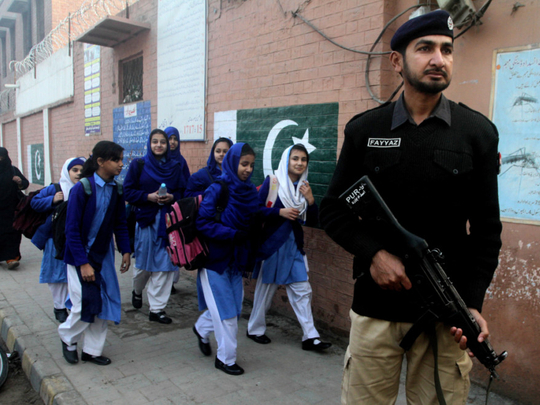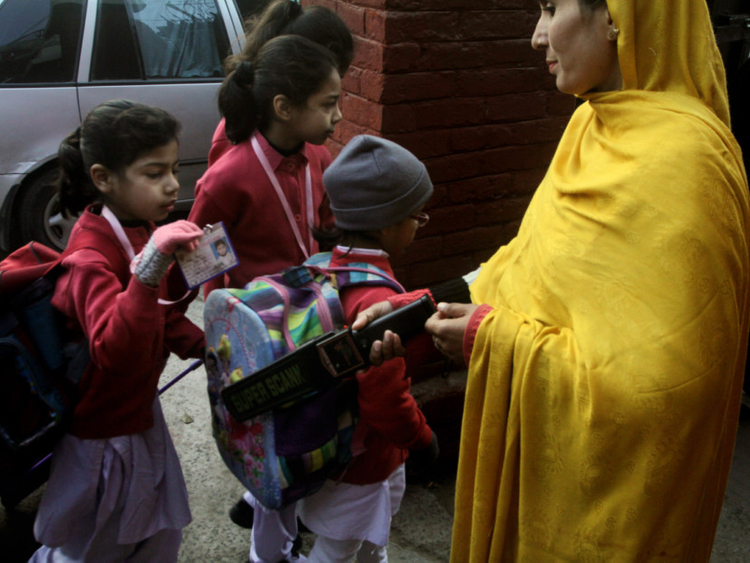
ISLAMABAD: After days of cold, a fitful sunlight emerged above the foothills of the Hindu Kush and schoolchildren in Peshawar took to the playground to play cricket and soccer.
Zeeshan Jehangir, 14, and his two best friends were not among them. The three — dressed in maroon-and-grey school uniforms — huddled on the stairs and planned out how it would be when the gunmen came for them.
Which part of the school wall could they scale the fastest? Where could they hide? Should they pool their pocket money and buy a pistol? They were planning for every eventuality, Jehangir said.
Which place is safe?
“Which place is safe? The threat is everywhere, school and home,” said Umair Iqbal, 13. “We sit in the back seats of our class. Nobody wants to sit in the front rows, because they will be the first killed.”
Students began trickling back to schools in Pakistan last week after widespread closures following the January 20 terrorist attack at Bacha Khan University that left 20 students and two employees dead.
But anxiety among parents and children throughout Pakistan remains high. A breakaway faction of Pakistan’s Taliban — believed to be responsible for the massacre of nearly 150 at a nearby school just over a year ago — claimed responsibility and then released a chilling video promising more school attacks.
Pakistan’s prime minister, Nawaz Sharif, directed schools to take additional security measures to insure safety and vowed to stop the extremists from killing children.
“Those who were threatening kids from going to school will be defeated,” he said.
Yet panicked parents, some who have continued to keep their kids at home, said they had little faith that the government could protect them. The scale of the security needs is daunting — the province where the attacks occurred has more than 27,000 schools and 200 colleges and universities.
“Where is the government and where are our security agencies?” asked Sohail Nasir, 51, a doctor and father.
“It seems it’s a matter of choice for terrorist organisations. They decide when to strike, take their time and then strike successfully again, and our security organisations can’t do anything about that.”
The Pakistan Taliban — an offshoot of the terror group waging insurgency in Afghanistan — has destroyed an estimated 1,500 schools in Pakistan since 2001, according to Pervez Hoodbhoy, a national security expert and physics professor at Forman Christian College in Lahore. They believe education in the state schools is contrary to Islam, and the only education that is needed is in madrasas, religious schools, he said.
“They say this is where apostasy is nurtured. In that sense they’re not that much different from the (Daesh),” Hoodbhoy said.
Militants in the same province shot a young girl in the head and neck as she sat waiting in a school bus in 2012. Malala Yousufzai survived and went on to win the Nobel Peace Prize in 2014.
The most recent attacks have disrupted learning in a country where educational attainment remains “dismally low,” according to a 2014 report from the Ministry of Education. One third of children — approximately 7 million — do not attend school at all, and 42 per cent of the country is illiterate, the report said.
Questions raised
The two school attacks, about a year apart, have raised questions about the efficacy of the government’s military campaign against the Taliban and Al Qaida insurgents in the country’s northwestern tribal belt, which has scattered militants and pushed them over the border into Afghanistan. Yet overall terror incidents are down, and by and large Pakistanis feel safer than they have in recent years.
After the December 2014 attack on the Army Public School in Peshawar, where nearly 150 students and teachers were killed, government officials and police urged schools to build walls, add armed guards and even train teachers to shoot, sparking a debate similar to the discussion of arming educators in the United States.
Students said a pistol-wielding chemistry teacher at Bacha Khan University may have helped some escape, but he was eventually shot to death.
“Those guys will come along with machine guns and there’s absolutely no use. It militarises the school environment and puts everything under a cloud of fear,” Hoodbhoy said.
To fight extremism, he said, the government must strike at the root of the problem and put in place “strict restrictions on the madrasas and mullahs and their apologists in society and in the press.”
Faisal Mushtaq runs a chain of private schools with 50 campuses and 24,000 students across the country. In the past year, he has installed a security system with armed guards, metal detectors and a biometric turnstile that identifies students by their fingerprint and sends a text to parents when the child enters. Male teachers have mandatory firearms training.
“We as teachers used to carry pens; now we have to learn how to fire guns,” Mushtaq said. “We have to get used to it because the enemy of the state has realised the weakness of society and that is the young child.”
Recently Jehangir returned to school for the first time since the university attack. He carried a mobile phone, a gift from his anxious parents.
“I fear the worst that could happen,” Jehangir said. “The violent scenes of the schoolchildren were always in front of my eyes,” he said. “I couldn’t get my mind out of those scenes for weeks.”













